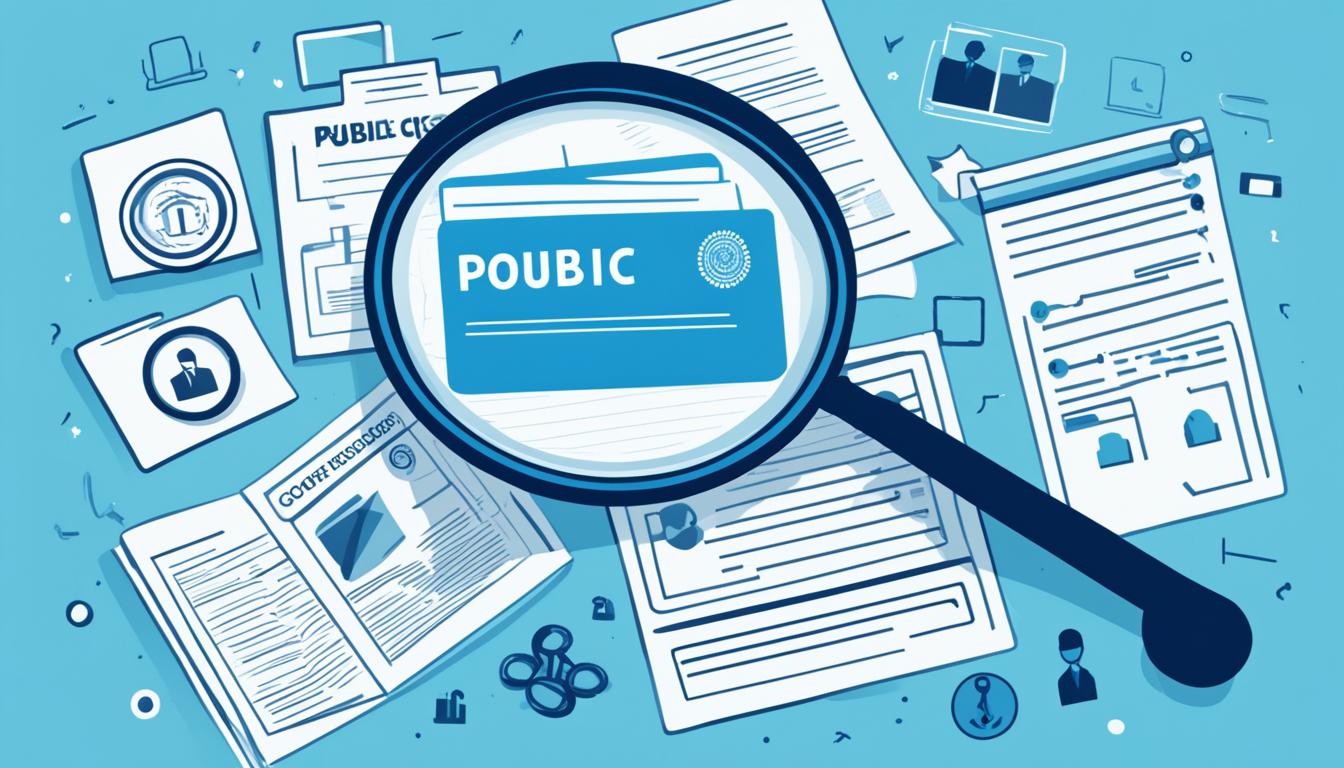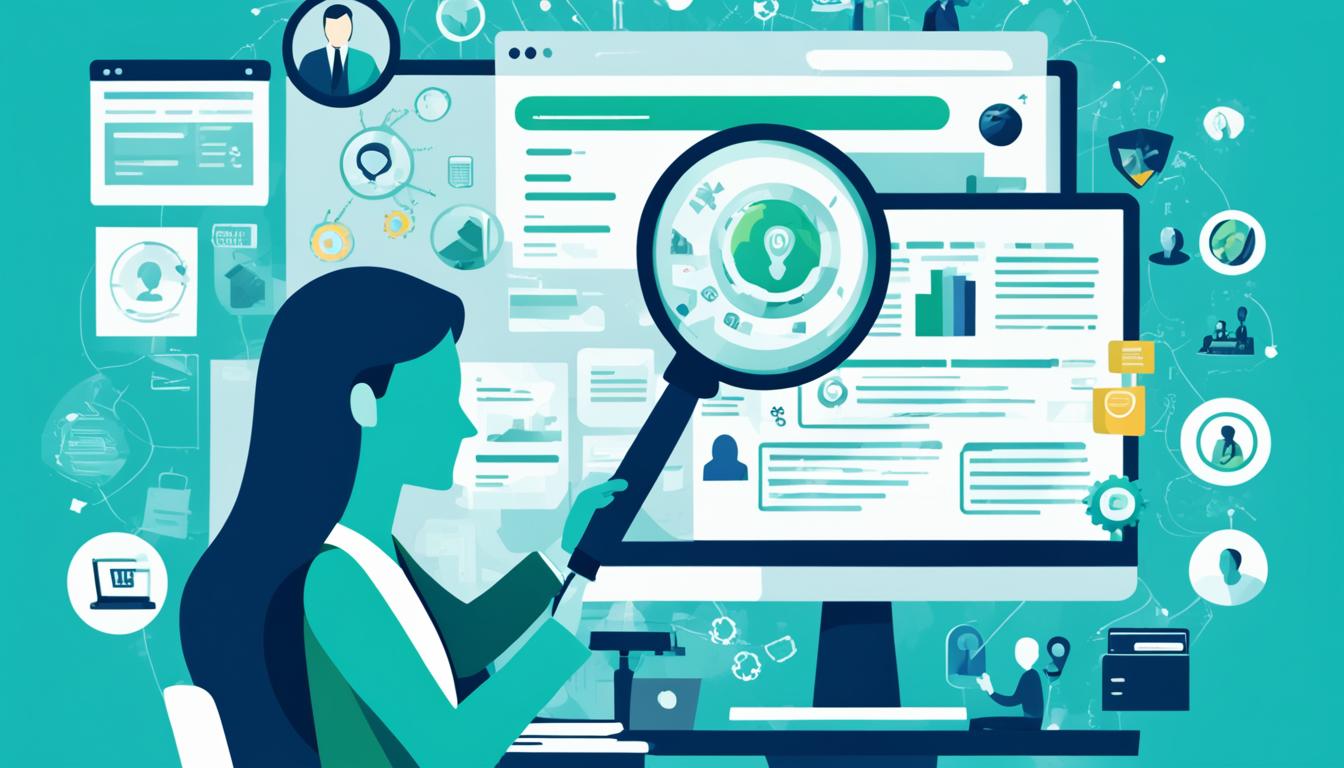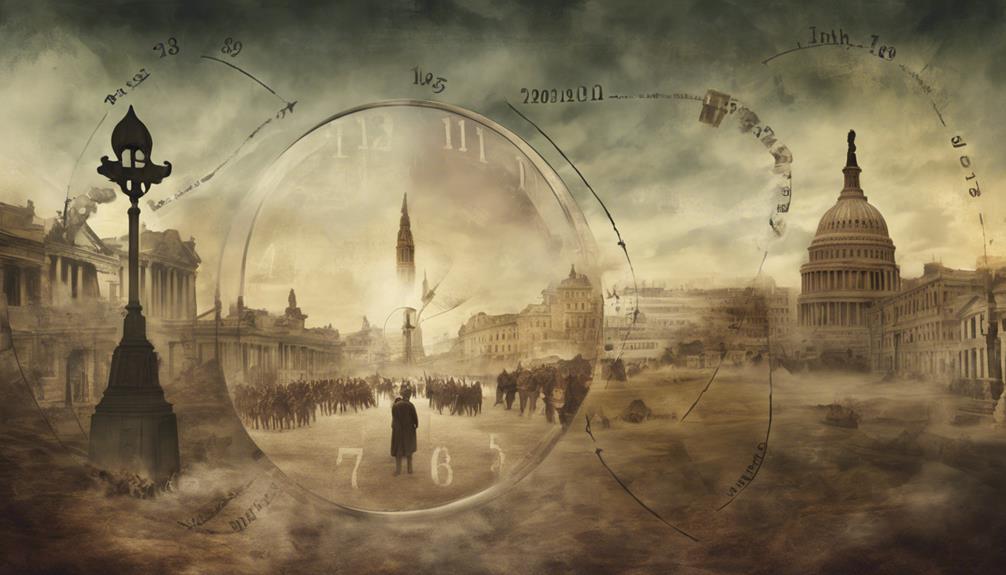Did you know nearly 27% of U.S. employers faced over $50,000 in losses from a bad hire?1 That’s a lot of money lost because of one mistake. This shows why it’s crucial to do thorough background checks before hiring.
A background check digs deep to reveal various details about a person. It looks into more than just the basic info from resumes or job applications. Employers use background checks to make smarter hiring choices. They also use them to keep their company and everyone there safe.
So, what exactly does a background check reveal? Let’s explore this further:
Key Takeaways:
- A background check is vital for employers to make well-informed decisions and avoid risks.
- It uncovers criminal records, checks past jobs, verifies education, and more.
- Nearly 27% of U.S. employers have suffered financially from hiring the wrong person.1
What Does An Employment Background Check Show?
An employment background check digs into a person’s past and qualifications. It uncovers important info for employers. This way, employers can figure out if someone is a good fit for the job.
Identity Verification
Checking who someone is is a big piece of the background check. Employers check the Social Security number to make sure the person is real. They use different ways to confirm someone’s identity.
Employment History
Knowing if someone really worked where they say they did is key. Employers match up the work history with what’s on the resume. They check the work dates, job titles, and what the job involved.
Credit History
Some jobs also look at a person’s credit history. This shows if someone handles money well. They look for any money problems like big debts or not paying bills on time.
Driver’s History
If the job needs driving, employers check driving records. They want to see if the person drives safely. The report has info on car accidents, traffic tickets, DUIs, and what kind of license they have.
Criminal Records
Looking for criminal records is a must in background checks. About one-fourth of these checks find a criminal record1. It looks through many databases for any crimes. Employers use this to know if there are any past crimes that matter for the job.
Education Confirmation
They also make sure someone went to the schools they said they did. They call the schools to check on degrees, GPA, and any special honors2. Employers need to know if the person’s education fits the job’s needs.
Additional Factors
Depending on the job, there might be more things to check. Like if someone has the right licenses or certificates2. Sometimes they look at social media to learn more about the person. They’re looking for anything that doesn’t fit the job, like breaking the law or acting badly online2.
There are strict rules for doing background checks. Employers usually do them after offering someone the job. They make sure the person knows about the check and agrees to it in writing2.
Background checks are super helpful for employers. They give them the info needed to pick the right person. Doing these checks helps create a safe and good place to work.
What Does An Employment Background Check Consist Of?
Employers run background checks with three main parts. These parts help them learn about someone’s identity, money management, and any criminal history.
The first part checks the person’s identity and Social Security number. It makes sure the Social Security number is real and matches the person’s name. This step builds trust and checks if the applicant’s details are true.1
Next, a credit report shows how someone handles money. It tells employers about the person’s debts, how they spend money, and if they might be bad with money. This part helps bosses decide if someone is right for a job where they manage finances.1
The last part is checking criminal records. It shows if someone has been in legal trouble before. Employers use this to understand the risks of hiring someone.1 Criminal records checks give a clear look at someone’s past run-ins with the law. This helps employers choose the right person for the job. They might also look into driving records, past jobs, school records, references, and drug tests, depending on the job.
| Components of an Employment Background Check | Statistical Data |
|---|---|
| Identity and Social Security Verification | Validating Social Security numbers and verifying identity |
| Credit Report | Revealing financial responsibilities and spending habits |
| Criminal Records Check | Exposing past convictions and pending charges |
| Additional Information (Varies based on job requirements) | Motor vehicle records, employment history, education verification, reference checks, and drug screening |
Background checks give employers a full view of a candidate’s past. They help employers hire wisely, avoid risks, and keep the workplace safe and strong.
Why Does It Matter What A Background Check Shows?
A background check’s findings can deeply influence who gets hired and the success of a company. A bad hire could cost over $50,0001. This sum covers losses, court troubles, reputation damage, and the price of hiring someone new. Background checks offer vital insights into someone’s past behavior and character.
Employers know a poor hire affects more than just the budget. It can disrupt the team, slow down work, and reduce output. With background checks, companies get essential info. This helps them make smart hiring choices and steer clear of future problems.
Almost 25% of work background checks turn up a criminal record1, says TransUnion. This fact underlines the need for detailed checks. They ensure workplace safety and guard against crime.
Background checks uncover many crucial details. They confirm a person’s identity, work history, and education1. This info helps employers check honesty, meet job standards, and hire with confidence.
By doing background checks, companies show they value a safe, secure workplace. They are committed to hiring people who fit their values and goals.
ShareAble for Hires looks at 300 million criminal records across the nation and state levels. It also searches sex offender lists and federal databases like those of the DEA, FBI, and Homeland Security1. This wide search ensures a detailed review of someone’s criminal past. Employers get a full picture of their possible hires.
Background checks are key because they guide employers in hiring decisions. They safeguard the business, ensure a safe workplace, and lower the risk of a bad hire1. Spending on thorough background checks is a crucial step. It can prevent financial and reputation harm to companies.
Criminal History Check: Keeping Your Business Safe
A criminal history check is a key part of background checks. It’s vital for jobs that require public interaction, managing sensitive info, or working with those in need. These checks help pinpoint past crimes that could threaten your business, its staff, and customers. They reveal convictions, ongoing cases, and other details at various government levels. This way, employers can make smart decisions to keep their workplace safe.
Employers need certain details for a criminal history check. These include the person’s full name, Social Security number, birth date, past addresses, any aliases, and county criminal search results3. The county search is especially important. It can be done through databases, by researchers contacting courts, or via court runners going to courthouses3. How quickly you get the results depends on the location, with digital methods often being faster than manual searches3.
Different results can come from criminal record checks. If there’s no criminal history, results usually come back quicker. This is due to fewer quality checks needed3. Also, if a job application is turned down based on their criminal record, the law says you must tell them3. Before saying no to an applicant because of their past crimes, businesses must fairly assess them. This follows rules set by the Equal Employment Opportunity Commission (EEOC)3.
Companies can also do global background checks in over 230 countries. These checks can look at criminal history, credit, education, and more3. But, the rules for doing these checks can differ a lot by place. For example, some places count driving offenses as criminal acts. Others only list them on driving records3. It’s key to follow both local laws and best practices. This keeps your checks legal and protects your business and the people applying for jobs.
Be wary of “instant” national criminal checks. These can be unreliable due to uncertain database info. You should always double-check facts at the source3. By sticking to thorough criminal history checks, businesses can make well-informed choices. This keeps their operations, team, and clients safe and sound.
Key Considerations for Criminal History Checks
| Consideration | Explanation |
|---|---|
| Permission Requirement | Criminal background checks typically require written authorization from the candidate. |
| Information Collected | Name, social security number, date of birth, address history, alias names, and county criminal searches. |
| Methods for County Searches | Data repositories, researchers contacting courts, or court runners visiting courthouses. |
| Delivery of Search Results | Varies by jurisdiction; electronic methods tend to be quicker than researcher or court runner methods. |
| Clear Results vs. Records | Clear results are often returned quicker than results containing records due to additional quality control steps applied. |
| Rejection Notification | Legal requirements exist to inform job applicants if they are rejected based on information from a criminal background check. |
| Individualized Assessment | An individualized assessment must be conducted before disqualifying an applicant based on criminal history, following compliance with EEOC guidance. |
| International Background Checks | Services are available to cover checks in over 230 countries, including criminal history, credit, education verification, etc. |
| Traffic Offenses | Criminal traffic offenses can appear on some county criminal searches but may only be found on a motor vehicle report in certain jurisdictions. |
| Instant Checks | “Instant” national criminal background checks are not recommended due to database content uncertainties and the need to validate information at primary sources. |
Financial Situation Check: Get a Picture of Your Applicant’s Financial Stability
Looking into an applicant’s financial situation is a key step during a background check. It shows their financial stability and how responsible they are with money. Checking their financial history offers clues about how they manage finances.
One way to understand an applicant’s financial status is by checking their credit report. The report includes credit scores, loans, and payment histories.4 This info helps determine if an applicant can be trusted, especially in jobs dealing with money.
However, bad credit shouldn’t automatically disqualify a candidate. Life events like health emergencies or job losses can hurt someone’s credit. Still, their credit history patterns are useful to understand their financial habits.4
Reviewing a candidate’s financial background helps decide if they can handle financial duties. This is crucial for finance jobs or roles needing financial decisions. A solid financial check supports wise hiring decisions and prevents money mismanagement.5
Checks for financial jobs are deeper than in other fields. This ensures employees who handle sensitive data are trustworthy.5
It’s vital to look beyond credit reports when evaluating someone’s financial situation. Their job history can indicate financial steadiness and commitment. A steady job record suggests reliability in handling financial obligations. But, job-hopping or employment gaps may signal instability.4

Education also sheds light on a person’s financial situation. Degrees from respected schools or relevant certificates suggest they are financially responsible and disciplined.
Interesting Statistics:
| Financial Services Background Checks | Financial Institution Regulations |
|---|---|
| Background checks in financial services are essential for meeting laws and safeguarding information.5 | Federal rules stop banks from hiring those with convictions for dishonesty or money laundering.5 |
| Bad hires in finance can mean big losses due to theft, embezzlement, or fraud.5 | Financial places must follow the Fair Credit Reporting Act and other laws during background checks.5 |
| Banks often require many checks, including criminal records and credit histories.5 | Companies should use Adverse Action steps if not hiring based on background check results.5 |
| Working with a third-party for background checks ensures thoroughness and compliance.5 |
Conducting a financial check provides a complete view of an applicant’s financial health. It’s important to be fair and considerate, recognizing individual situations. With this approach, employers can hire people who fit the job and protect the company’s financial interests.4
The Significance of Background Checks in Various Contexts
Background checks are crucial not just for jobs but also for things like renting or dating. They help figure out if someone is trustworthy, which cuts down on chances of rent issues or property damage6. When dating or making new friends, knowing a person’s past can keep you safe6.
Landlords do background checks to find reliable, financially stable tenants. This avoids renting to those who may cause damage or fail to pay rent6. Checking a tenant’s history ensures a good rental experience for both landlord and tenant6.
In personal relationships too, background checks are informative. They’re key whether you’re considering a new partner or friend. They help you stay safe by knowing who to trust6. Background checks allow you to avoid risky situations6.
Background checks aid in making informed choices in various situations, protecting everyone’s safety. Be it for jobs, renting, or new relationships, they offer insights and reduce dangers6.
Different Types of Background Checks
There are many ways organizations can learn about people through background checks. These checks can tell a lot about a person’s past and skills. Here, we’ll look at some common background checks:
Criminal Background Checks
Criminal background checks are vital for jobs needing high trust, like those dealing with sensitive info or vulnerable people. They search through various records, including national and state criminal databases, sex offender lists, and global terror watch lists. This helps employers find any past crimes or current charges that could be worrisome7.
Employment Background Checks
Employment checks verify a person’s job history, educational background, and other key details. These insights help employers understand an applicant’s past jobs, stability, and work character7. They are usually done before offering a job or early in the onboarding process. This ensures that the applicant’s claims match their true background7.
Credit History Checks
Credit checks look into a person’s financial past to judge their financial behavior and stability. They’re useful for jobs involving money handling or sensitive data. By checking credit scores, payment records, loans, and bankruptcies, employers can spot financial risks7.
Education Verification
Checking educational claims is a must to confirm a candidate’s stated qualifications. Employers might reach out to schools or use third-party services for verification. This makes sure a candidate has the necessary education for a job7.
Motor Vehicle Records Checks
MVR checks are key for jobs that require driving. This includes roles that use company cars or involve transporting goods or people. By reviewing driving records, employers can identify any past driving issues like offenses or accidents7.
Professional License and Certification Checks
Some jobs, like plumbers or teachers, need specific licenses or certifications. In these cases, employers check to ensure the applicant’s credentials are valid. This confirms they are qualified for the job7.
Through these various background checks, employers can get a full picture of their candidates. This helps them determine if an applicant fits the job. Each type of check has its own importance, helping businesses stay safe and reliable.
Compliance Considerations and Legal Requirements
When doing background checks, it’s vital to follow compliance considerations and legal requirements. This makes sure the process is fair, not biased, and follows the law. Each place and job type might have its own rules about what information you can use and how you do background checks.8
Employers need to understand and act according to the laws, like the Fair Credit Reporting Act (FCRA) and Equal Employment Opportunity Commission (EEOC) rules. These laws have specific demands and limits for employers doing background checks. They aim to protect people’s privacy and prevent unfair treatment in hiring.9
For example, the FCRA has rules where employers could be fined up to $1,000 for each mistake. Not following FCRA’s rules carefully can lead to big legal costs. One case against Costco ended with a settlement near $2.5 million.10
It’s also important to not have a one-rule-fits-all attitude about not hiring anyone with a criminal record. This could break the Civil Rights Act of 1964, which fights against job discrimination. A case against the Missouri Pacific Railway Company showed why it’s important to look at each application on its own.10
A good background check policy helps keep the hiring fair and consistent. This policy should list what checks are needed for different jobs, like checking past jobs, professional licenses, criminal records, credit scores, and driving records.9
Employers should have clear steps for doing background checks. This includes getting permission through forms, having a way to check the information’s truth, and deciding how to think about criminal records when hiring.9
Keeping background check records for at least a year shows a company’s dedication to doing things right. Updating the policy often, maybe every six months or once a year, is also a good practice.9
“Conducting background checks must be done in compliance with applicable laws and regulations to ensure a fair and ethical process.”
By sticking to compliance considerations and legal requirements, employers can do background checks the right way. This protects both the job seekers and the company.
| Compliance Considerations and Legal Requirements Highlights |
|---|
| Adhere to applicable laws and regulations, such as the FCRA and EEOC regulations. |
| Avoid blanket policies against hiring individuals with criminal convictions to prevent discrimination claims under Title VII. |
| Establish a comprehensive background check policy outlining the specific types of checks needed for different positions. |
| Document procedures for conducting background checks and establish processes for information verification. |
| Keep background check information on file for at least a year and regularly update the policy. |
Conclusion
Background checks are crucial in the hiring process for employers. They are also valuable for people seeking reliable information. These checks give insights into someone’s criminal history, job history, financial status, and more.
By doing thorough checks, employers can make smart hiring choices. This helps protect their business from potential threats. They can also keep a safe and productive work space1. People can use these checks to make sure credentials are real. They can check on personal ties and stay safe in many situations11.
Knowing what a background check involves and its importance is key. It matters a lot for both employers and individuals.
FAQ
What is a background check?
Why is an employment background check important?
What information is revealed in a background check?
What does an employment background check show?
What does an employment background check consist of?
Why does the information revealed in a background check matter?
Why is a criminal history check important?
Why is a financial situation check important?
In what contexts are background checks significant?
What are the different types of background checks?
What compliance considerations and legal requirements should be considered when conducting background checks?
What Types of Investigations Are Included in a Background Check?
When conducting a background check, various types of investigations may be included. These can range from criminal history checks and employment verification to education and credential verification. Additionally, dcfs investigations background checks explained are conducted to assess an individual’s history with child protective services and other related agencies.
Source Links
- https://hires.shareable.com/blog/what-does-a-background-check-show
- https://money.com/what-does-an-employment-background-check-show/
- https://www.foleyservices.com/articles/understanding-what-shows-up-on-a-criminal-background-check-1
- https://money.com/what-do-employers-look-for-in-a-background-check/
- https://iprospectcheck.com/financial-services-background-check-guide/
- https://checkr.com/background-check/california
- https://www.veremark.com/blog/a-comprehensive-guide-to-all-types-of-background-checks
- https://s2verify.com/resource/background-screening-compliance-landscape/
- https://checkr.com/resources/articles/background-check-policy
- https://iprospectcheck.com/background-check-compliance/
- https://enhancv.com/blog/how-do-i-know-if-i-passed-my-background-check/









